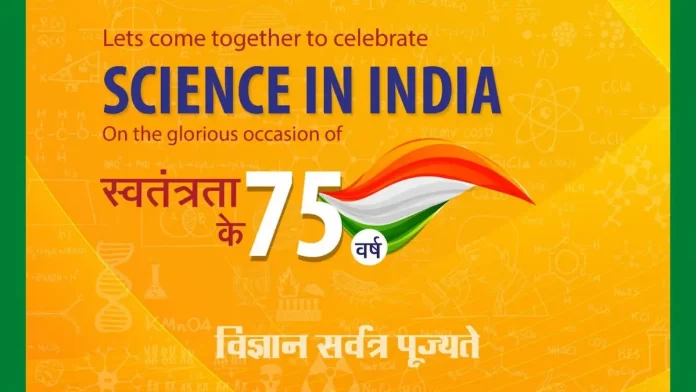Vigyan Sarvatara Pujyate is a week-long festival to showcase 75 years of India’s achievements in the science and technology sector. It is being celebrated as part of the Azadi ka Amrit Mahotsav from 22nd-28th February 2022.
The event would display the country’s scientific legacy and technology prowess that has helped find solutions to defense, space, health, agriculture, astronomy, and other sectors.
Aim of Vigyan Sarvatara Pujyate Program
Vigyan Sarvatara Pujyate program has been designed to inspire India’s youth and help them navigate into building a progressive nation. In particular, it aims to-
- Bring to the fore stories of people in science who made these achievements possible.
- Reinforce the commitment of the scientific community towards the economic and social development of the country;
- Present the awe-inspiring futuristic mega-science projects embarked by the nation and
- Highlight the work being done by R&D organizations from across the country
Vigyan Sarvatara Pujyate event is jointly organized by the Indian government’s various science and technology organizations under the leadership of the office of the Principal Scientific Officer to the Government of India and the Ministry of Culture.
Vigyan Prasar, an autonomous organization of DST with a mandate to promote science communication in the country, is the coordinating agency.
Vigyan Sarvatra Pujyate Themes
The programs have been grouped under four themes. The first theme is “from the annals of the history of Science and Technology”.
This section traces the contributions of founders of modern science and institutions of national importance to nation-building.
It will be done in the form of the screening of 75 films on 75 scientists, and 75 lectures by eminent scientists and technocrats across the 75 locations.
The programs under the second theme, “Milestones of Modern Science and Technology”, will highlight critical discoveries, innovations, or inventions that made a mark in the global science or India’s development story.
The third theme, “Swadeshi Paramparik Inventions and Innovations’, will showcase 75 inventions or technologies that made India self-standing and helped in achieving the goal of self-reliance by drawing upon the reservoir of traditional knowledge systems, such as drugs from herbs.
The fourth theme, “transforming India”, will look at the road ahead for the next 25 years of Indian Science and Technology.
It would include talks by 75 eminent scientists and technocrats from within India and the diaspora on their ideas for Indian Science and Technology as it marches towards the centenary year of India’s independence.
Dhara: An Ode to Indian Knowledge System
The Ministry of Culture will also organize a series of lecture demonstrations under the ambit of “Dhara: an Ode to the Indian Knowledge System”.
The first event under this series is dedicated to “India’s Contribution to Mathematics through Ages” and will cover the mathematics of the Ancient period.
It will pay special focus on geometry in Sulbasutra, Pingala’s Chandasastra, landmarks in Indian algebra, Jyotpatti, trigonometry, indeterminate equations in Indian algebra, Madhava’s infinite series for Pi, calculus of trigonometric functions, etc.
Several similar events around Economic Thought in Ancient India, Metallurgy, Agriculture, etc. will also be organized.
Science Literature Festival
The Mahotsav would include a mega expo and a book fair to be held on the grounds of Jawaharlal Nehru Stadium in Delhi.
The science literature festival will bring together science writers, communicators, artists, poets, dramatists, street play artists, hands-on science demonstrators, journalists, students, and teachers.
The literature festival aims to communicate science through theatre, poems, various folk forms, and cultural events, including a puppet show, and shadow play.
Besides, several competitions, including quiz programs, essays, posters, and poetry contests are being held to promote scientific temper, particularly among the youth and different science activities are also being organized at all the 75 locations.
The open-ended, hands-on activities are aimed at motivating young learners to appreciate the joy of science learning by doing it. Through these participatory opportunities, Jan bhagidari in the celebrations would be nurtured.
The program will be held in various Indian languages, including Kashmiri, Dogri, Punjabi, Gujarati, Marathi, Kannada, Malayalam, Tamil, Telegu, Odiya, Bengali, Assamese, Nepali, Maithili, and Manipur, and will include the screening of 75 films.
The inaugural program would be held at Vigyan Bhavan, New Delhi on February 22 at 3 PM and will be telecast live at all the 75 locations across the country, where the festival is being organized.
National Science Day: 28 February
The Vigyan Sarvatara Pujyate program will end with a grand valedictory function. It will coincide with the National Science Day, celebrated on February 28 every year since 1987 in remembrance of Nobel Laureate Sir C.V. Raman’s path-breaking discovery of the Raman Effect in 1930.
National Science Communication Awards to this year’s awardees and prizes to the winners of various contests held as part of the Mahotsav would be presented.
The entire event, including the main inaugural and valedictory functions at Delhi, will be live-streamed from across all 75 places.
All events would be organized mindful of the relevant and required COVID protocols and adhere to the directives of appropriate agencies.
